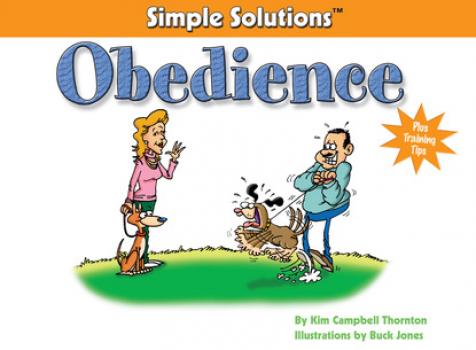ТОП просматриваемых книг сайта:
ЛИТМИР - LITMIR.BIZ - Электронная библиотека
Скачивание или чтение онлайн электронных книг.Аннотация
Solving the Mysteries of Breed Type is one of the leading titles in the Kennel Club Pro™ series, targeted at experienced and avid dog fanciers who demand the absolute best.This book is the “standard” against which all other dog breeding books will be measured.
Аннотация
The experts at Kennel Club Books present the world's largest series of breed-specific canine care books. Each critically acclaimed Comprehensive Owner's Guide covers everything from breed standards to behavior, from training to health and nutrition. With nearly 200 titles in print, this series is sure to please the fancier of even the rarest breed.
Аннотация
As author Kim Campbell Thornton begins this Simple Solutions guide, “Dogs are known as man’s best friend, but they don’t come ready-made to take on this role.” Socialization unlocks the key to the human-dog bond and explains how well-mannered, well-adjusted dogs are made (not born). A term used by canine behaviorists and trainers, socialization is a fancy five-syllable word for “getting friendly,” which doesn’t come naturally to all dogs. This handy little book begins with a discussion of puppy life stages, showing how puppies developmentally mature and what their ever-changing needs are. New puppy buyers must be aware of the importance of the breeder’s role in socializing a litter of puppies, a critical process of introducing each pup to people, other dogs, and common everyday noises, during its critical developmental stages. Puppies raised without socialization (typically in a commercial breeding establishment, sometimes called a puppy mill) have a decided disadvantage and may never develop into normal, well-adjusted dogs. The book gives the new dog owner advice about planning social outings for the puppy so that he has “People to Meet, Places to Go,” ever expanding his social graces and comfort level with strangers and the not-so-scary-after-all unknown. The author also provides excellent guidance on introducing a dog to a new baby as well as introducing an adopted dog into an established multipet household.
Информация о книге
Автор произведения Kim Campbell Thornton
Жанр Биология
Серия Simple Solutions Series
Аннотация
A Beginning Vivarium Systems guide, Snakes is an entertaining and educational introduction to the world of snakes of all sizes, colors, and personalities. Beginning snake keepers of all ages will find intriguing information about common and unusual snakes in this colorful guide by herp expert Russ Case. The book offers readers who are looking to adopt a snake the right guidance for purchasing a healthy specimen and for creating a safe, comfortable home where the pet snake can thrive. Beginners will learn about the anatomy of snakes and their behavior in the wild and in captivity. The chapter “Snake Food” is a lesson in how to feed snakes so that owners meet all of the special needs of their pets. The chapter “Great Beginner Snakes” present the most common species for newcomers to snakes, including such favorites as the corn snake, California king snake, ball python, and the rosy boa, each illustrated with color photos and explained in clear everyday language. Additional examples of “Other Amazing Snakes” are included, such as the boa constrictor, Burmese python, reticulated python, king cobra, rattlesnake, which are fascinating to read about though not recommended for beginners. A chapter on potential health problems gives a basic overview of how to care for and maintain captive snakes in the best of health. Sidebars throughout the text give the reader good advice on dos and don’ts to avoid common mistakes keepers make with these pet animals. Glossary included.
Аннотация
An ancient desert sighthound from northern Africa, the Sloughi remains as mysterious and exotic to the Westerners as do its homelands of Morocco, Algeria, Libya and Tunisia. World authority and leading Sloughi breeder Dr. Marie-Dominique Crapon de Caprona has provided an astoundingly complete portrait of her beloved breed, including an insightful look at the breed's lands of origin, the breed's importation to Europe, the US and Canada, a comparative look at the Sloughi and its close relative the Saluki, Greyhound and Azawakh, and the breeders and famous dogs who have established the breed in the modern-day world of pure-bred dogs.
Аннотация
Elegant and dignified, the Skye Terrier, named for the rugged Isle of Skye, stands tall among Scotland’s “below the knee” terriers in character and courage. Few pure-bred dogs match the Skye Terrier in independence and liberal thinking, as this intelligent terrier has a mind of his own and a heart to share with his like-minded, well-informed keeper, who is not averse to a little humility in the training department. Although not a choice for the first-time dog owner, the Skye Terrier proves to be a loyal and devoted companion to those he loves. Likened to a caterpillar, the Skye has a look all his own, “long, low and level” with a profuse coat that “falls straight down either side of the body,” according to the breed standard. The Skye will most assuredly act like a Skye, delighting and challenging his ever-devoted master.Terrier breed expert and author, Muriel P. Lee provides an up-to-date look at the Skye Terrier, including the breed’s history in England and the United States as well as its character and breed standard. The author also details everything that a new owner needs to know about acquiring a well-bred Skye Terrier puppy, bringing him into a safe home and establishing a house-training and obedience regimen. In addition to the basics of everyday care, including feeding, grooming and exercise, this comprehensive guide also includes up-to-date information on healthcare, written by Dr. Lowell Ackerman, well-known Harvard lecturer and veterinarian.Lavishly illustrated, this excellent chapter on preventive healthcare advises owners on selecting a qualified veterinarian, controlling parasites, vaccinations and infectious diseases and more.
Аннотация
A Simple Solution book for every dog owner who wants to have a well-behaved companion, Obedience by Kim Campbell Thornton is essentially a sweet and quick brush-up course on doggy manners. Exhibiting social graces in public places and good behavior around the home, your dog will be a welcome, much-loved companion thanks to Obedience. Topics covered include sitting pretty, jumping up, staying off furniture, come when called, and accepting attention from strangers. This little book is all about bonding with your dog and communicating. It concludes with “The Eleven Commandments of Good Dog Ownership,” which outline what owners need to do to ensure their good canine citizens will remain so.
Информация о книге
Автор произведения Kim Campbell Thornton
Жанр Домашние Животные
Серия Simple Solutions Series
Аннотация
The experts at Kennel Club Books present the world's largest series of breed-specific canine care books. Each critically acclaimed Comprehensive Owner's Guide covers everything from breed standards to behavior, from training to health and nutrition. WIth nearly 200 titles in print, this series is sure to please the fancier of even the rarest breed!
Аннотация
The experts at Kennel Club Books present the world's largest series of breed-specific canine care books. Each critically acclaimed Comprehensive Owner's Guide covers everything from breed standards to behavior, from training to health and nutrition. With nearly 200 titles in print, this series is sure to please the fancier of even the rarest breed.
Аннотация
The experts at Kennel Club Books present the world's largest series of breed-specific canine care books. Each critically acclaimed Comprehensive Owner's Guide covers everything from breed standards to behavior, from training to health and nutrition. With nearly 200 titles in print, this series is sure to please the fancier the fancier of even the rarest of breed!










